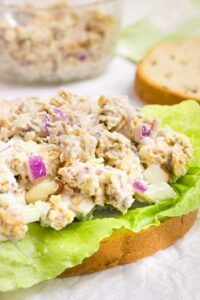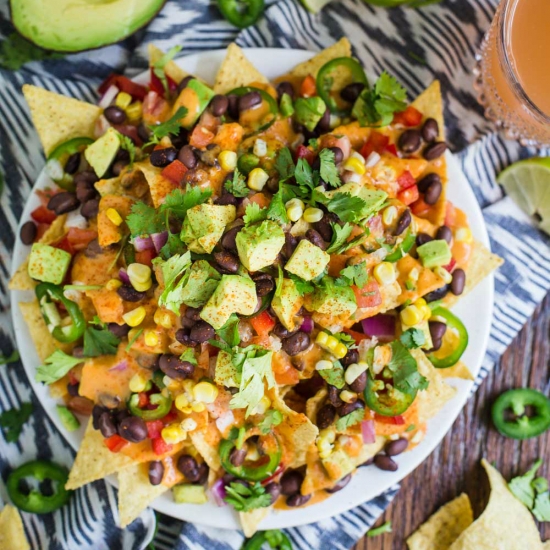The details of this diet are in the terminology itself. A vegan diet comprises of foods that are devoid of any animal products such as meat, dairy, eggs, and even honey. The core structure of a vegan diet rests on plants and foods that are by-products of natural plants. Some of these include fruits, vegetables, grains, and even nuts.
Vegan diets have started to gain considerable traction due to people becoming more health conscious with each passing day. They have numerous health benefits along with ethical reasons such as avoiding animal cruelty, but there are some drawbacks of this diet that many may not be aware of. If you are thinking of going on a vegan diet but wish to do your homework before diving head first, then you have come to the right place. Here is a breakdown of some of the pros and cons of vegan diets that you should be aware of.

Vegan “Chick”en Salad
The Pros
To get started, let’s shed some light on the benefits of a vegan diet.
Healthier Body and Mind
A vegan diet is loaded with fiber and comes with minimal calories and saturated fats. It’s the perfect way to reset your body towards becoming leaner and healthier. It also helps in weight loss and reduces inflammation in the body. Not only this but going vegan can also help reduce the risk of certain diseases such as diabetes, obesity, cancer, and cardiovascular diseases. Thus, vegan diets help keep the gut healthy, leading to an improvement in your mood as well. It is a win-win situation for sure!
Budget-Friendly
Certain meats, seafood and dairy products can be costly. They can take up a huge portion of your monthly budget. Vegan and plant-based foods on the other hand are much more affordable and lighter on your pocket. Though fresh vegan foods may be pricey, they’re still less expensive than fresh animal-based products. This helps you save up on a lot during the month. Here is a recipe for my delicious Vegan “Chick”en Salad. It is by far my most popular vegan dish on my meal prep menu, every time it is on the menu.
The Best Vegan “Chick”en Salad
- 1/2 cup of raw, slivered almonds
- 15 ounce can chickpeas, drained and rinsed
- 2 celery ribs, finely chopped
- 1 tsp of red onion, diced small
- 1/2 cup of vegan mayo (my go to is Vegannaise, it is a staple in my home!!)
- 1 tablespoon of fresh lemon juice
- salt and pepper to taste
Preparations:
- 1. In a food processor pulse the slivered almonds a few times until broken up. Do not over process, these nutty pieces add texture to the salad.
- Add the drained and rinsed chickpeas to the food processor with the almonds, and pulse 2-3 times until the chickpeas are slightly broken down. You can leave a few beans whole if you’d like.
- Add the chickpea mixture to a large bowl and mix in the onion, celery, vegan mayo, lemon juice, and salt and pepper to taste.
- Serve on bread with lettuce, on a salad or, with crackers and enjoy!
More Variety
When you go vegan, you’re sure to find a lot of variety. In fact, you’re sure to come across a lot of foods that you have never heard of or tried before. This makes vegan diets exciting – experimenting with different food types and coming up with creative recipes help add to the fun.
Sustainable for The Environment
Since no animals are harmed in order to produce vegan-based food products, a vegan diet is appealing to many animal lovers. That’s not all, it is also sustainable for the environment. Vegan foods require fewer resources to produce and are also better for the environment as compared to animal-based products. Cows for instance contribute towards releasing greenhouse gasses into the atmosphere that speed up the process of climate change.
The Cons
With the pros, the cons follow as well. Here are some of the drawbacks of a vegan diet that you should be mindful of before getting on board.
Nutritional Deficiencies
Vegan diets are often criticized for aiding calcium and Vitamin B-12 deficiencies. These are usually found in abundance in animal-based products such as dairy and meat. They help your body perform healthy nerve functioning and cell regeneration.
Apart from this, certain amino acids present in proteins may be lacking in a vegan diet as well, along with Vitamin D. Thus to cover up for these deficiencies, it’s important to be mindful of what you eat. Certain vegan foods can help you stay clear of developing a nutrient deficiency in this regard such as mushrooms, flax seeds, chia seeds, and legumes. You may also opt for oral supplements that are vegan friendly to aid here as well.
Difficult to Adjust To
While a vegan diet comes with many benefits, it also can become challenging to adhere to it strictly. Being mindful of what you eat, especially when out with friends or while dining out can be stressful. Also, there may be days when you crave certain animal-based foods, and finding an alternative to satisfy your needs may be a tough challenge. Thus, going on a vegan diet requires willpower and determination. Researchers have found that individuals who go vegan due to ethical reasons, find it easier to stick to a vegan diet as compared to those who wish to do it for health concerns.
Some Vegan Foods That You Can Add to Your Diet
If you do wish to go vegan, you can do so in a gradual manner. Going cold turkey may not be sustainable for your body. Here are some foods that you can consume on a daily basis if you are a beginner.
Fruits and vegetables – make sure to be mindful of adding fruits and vegetables to your breakfast, lunch, or dinner. You can even replace your snacks with fruits as well.
Legumes – these include protein-packed lentils, peas, and beans. Add them to your salads or soups for some diversity and flavor.
Replace dairy with almond, soy, or oat milk. They’re lighter on the stomach and packed with protein, phosphorus, and vitamins – thus making u for the calcium deficiency.
Whole wheat foods – from quinoa, barley, oats, and brown rice to millet and corn, the options here are endless. Try them out and see which one you like the best.
Nuts and seeds such as almonds, cashews, peanuts, etc.
Healthy fats – replace your butter with olive oil, coconut oil, or avocados.
The Key Takeaway
A vegan diet is more of a lifestyle change. The benefits you can reap are plenty. However, it is important to be diligent about what you consume. You don’t want to devoid your body of some essential minerals and nutrients. Do remember to load up on the essential nutrients and vitamins, whether via supplements or through a carefully crafted diet plan.
So, if you’re thinking of switching to this lifestyle, get into it with a determined and focused approach. It’s sure to help you stay on track and improve your overall health. You can even share this article with a friend or family member and encourage them to join you on this journey as well. It can help you transition easily and in a sustainable manner.

Loaded Vegan Nachos with Assorted Toppings and a Cashew Queso

